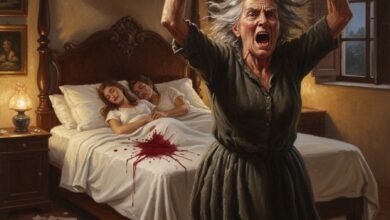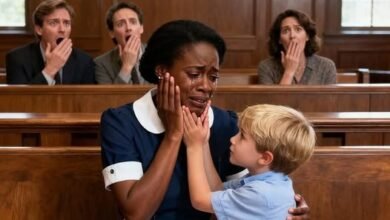On his farm, an old man discovered three abandoned infants. And when he got closer, he was shocked to notice something unusual….

John Peterson, a seventy-year-old man who had spent his entire life working the land, lived in a modest homestead surrounded by mountains. The sun was just beginning to rise, casting a soft light across the mist-covered fields. His face, carved with deep wrinkles and a quiet smile, reflected decades of wisdom and sacrifice.
Like every other morning, he set out early with Bella, his loyal dog—a mixed breed with bright, watchful eyes who never left his side. As they crossed the foggy field, John noticed Bella, usually calm and quiet, suddenly barking and running toward a small grove at the edge of the property.

“What is it, Bella?” he asked in his gravelly voice, following her.
The air grew colder as they moved into the trees. Bella darted ahead and stopped near a shrub. From that spot, a soft cry broke the silence.
John’s heart pounded as he gently pushed aside the branches. To his astonishment, he found three babies, wrapped in tattered blankets and laid on a bed of dry leaves.
“Dear God…” he whispered, kneeling down to check if they were breathing.
Two girls and one boy. They were trembling, cheeks red from the cold, their tiny bodies weak with exhaustion. John looked around, searching for anyone—any clue as to who could have left them there.
“Who would do this?” he murmured, running a trembling hand over his face.
Bella stared at him as if urging him to act.
With a heavy sigh, John carefully gathered the babies into his arms, wrapping them in his old wool coat… and then he froze.
Each child wore a small silver charm on a short chain: one shaped like a moon, another a sun, and the last a star. The early morning light made it hard to see the tiny engravings on them, but something about it unsettled him. Stranger still, the babies stopped crying the moment he brought them closer together, as if they found comfort in each other’s presence—connected by something unseen.
Though usually confident and decisive, John found himself stunned. This farm was all he had. A few neighbors in the nearby village, but no one to call for help with three unexpected infants.
“We have to do something, Bella,” he finally said.
He grabbed a large basket from the barn, lined it with blankets and shirts, and gently laid the babies inside. Back in the house, he placed them near the heater and found some condensed milk in the pantry. He warmed water and made a makeshift formula, feeding each child carefully with a spoon until they swallowed slowly and drifted off to sleep.
As he watched them, he couldn’t stop wondering: Why his land? Who left them here? His farm was remote, far off any main road. It wasn’t a place someone would stumble upon. Whoever did this must have done so intentionally.
Still, he felt a strange calm. He was never meant to raise babies—not at seventy—but here they were.
He picked up the phone and called Marta, a retired nurse and close friend from town.
“Marta, I need your help. I found… three babies on my land.”
She was shocked, but her instincts kicked in.
“I’ll be there as fast as I can. Should I come to you or do you think you can bring them?”
“I’d rather not move them,” he replied. “It’s cold, and they’re too fragile.”
“I understand. I’ll be there in thirty minutes.”
As they waited, Bella sat next to the basket, watching over the infants. John paced, filled with questions. Who were these children? What did the charms mean? Were they meant to stay together?
When Marta arrived with her medical bag, she examined each baby thoroughly. “They’re fragile,” she said, “but stable. You did a good job, John.”
She found something else too: a small, crumpled note tucked inside one of the blankets.
“Please, love them enough for me.”
John’s eyes welled up with tears. This wasn’t just abandonment. This was heartbreak. Someone left these children hoping they’d be found, cared for, loved.
The news spread fast. The local sheriff, Harvey, came to investigate. But there were no missing persons reports that matched, and the charms yielded no clear answers—just a moon, a sun, and a star, each etched with the letter “L.”
Meanwhile, the babies slowly grew stronger. John transformed his late wife’s sewing room into a nursery, building small cribs and humming lullabies he hadn’t sung in years. Neighbors came with diapers, formula, clothes. Marta checked in often. Bella stayed nearby, guarding them like a gentle protector.
Then, about a week later, John received a letter—no return address, just his name on the envelope. Inside, a note:
“They’re all I have left of a broken family. Don’t look for me. Please care for them.”
No signature. Just pain. But also, trust.
He decided he would care for the children until the mother returned—or a better plan could be made. The community knew them as “the star babies.” John gave them names—Hope, Grace, and Ray—so they’d hear something warm and kind in the quiet of the night.
Weeks passed. Then, Adriana, a neighbor and friend who had lost a child years before, offered to be their foster mother. She insisted John stay involved. After all, he’d saved their lives. They agreed: he would be their honorary grandfather, and the babies would stay in the village.
The babies grew. Their laughter echoed through Adriana’s home. The silver charms stayed around their necks—a reminder of that mysterious morning in the woods. John found new purpose. He helped Adriana plant a garden, taught the toddlers to care for animals, and told them bedtime stories under the stars.
Sometimes, life’s greatest miracles appear in the most unexpected ways. That morning, John Peterson didn’t just save three children—he saved himself too.





